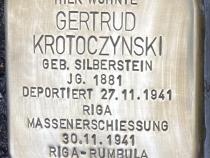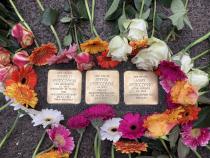Gertrud Krotoczynski, the youngest of eight siblings, was born on the 1st of August 1881 in Berlin. Her parents, Abraham Silberstein (1840-1915) and Marie Silberstein, née Rosenbaum (1843-1906), came from Schönlanke (Trzcianka), a city now in Poland that was in the German-speaking state of Prussia from 1772 to 1945. Gertrud was the youngest in her large family and the last to marry. She remained with her parents until her father, Abraham, died in 1915. She then lived with the family of her oldest sibling and only brother, Siegfried, and helped to care for his son, Fritz. Several years later, Siegfried introduced Gertrud to Stefan Krotoczynski through a business acquaintance, and after a brief courtship, they married in 1920 and settled in Friedland, Mecklenburg where Gertrud gave birth to Mary, their only child in 1922.
Gertrud and her family lived in Friedland for six years. Friedland was reachable by train from Berlin, which enabled Gertrud to keep in touch with her family. In 1928, her husband’s business reversals forced them to give up their home and move in with his relatives in nearby Strasburg, where they stayed for a year before moving permanently to Berlin to be near Gertrud’s married sisters and their families.
Several members of the Silberstein family were textile merchants, including Gertrud’s brother, Siegfried, who worked for the Jewish-owned Wertheim department store on Leipziger Platz, the largest department store in Europe at that time. When Gertrud and her family moved to Berlin, Siegfried and his family helped them get established and provided significant financial support to supplement Stefan’s earnings as a cantor for synagogues in Mecklenburg. Two years after Gertrud and her family came to Berlin, Siegfried started his own business, ‘Siegfried Silberstein Morgenröcke’, specializing in dressing gowns. This business was taken over by the Nazis in 1938 and liquidated in 1939.
Like many Jews in Berlin, Gertrud and her family experienced discrimination and persecution after the Nazis came into power. With help from the Jewish Community in Berlin, they sent Mary to the Jewish Girls School in the Mitte Section of Berlin. When she graduated from the school in 1937, there were no options for further schooling and the family struggled to make a living. Since her father had a heart condition and could not work, Gertrud and Mary took domestic jobs in the homes of Jewish families. Efforts to obtain immigration visas to America failed despite the willingness of relatives to sponsor them. By 1939, since immigration was no longer an option, Gertrud and her husband arranged to have their daughter leave Berlin for London through the Kindertransport program. Afterwards, Gertrud and Stefan corresponded with her through relatives in America who forwarded their letters to her in England after Britain declared war on Germany. In 1941, Stefan, died of heart failure resulting from a beating by Nazi militia and was buried in the Jewish Cemetery in Berlin-Weissensee. When the United States declared war on Germany in 1941, the only alternatives for communication were short messages through the International Red Cross. In 1942, Mary received a message from friends that her mother and aunts had been deported. After the war, Mary learned that her mother was forced onto a deportation train at Grunewald Station in Berlin, with 942 fellow Berlin Jews. Gertrud was murdered on the 30th of November 1941 in a massacre at Rumbula Forest near Riga, Latvia.




